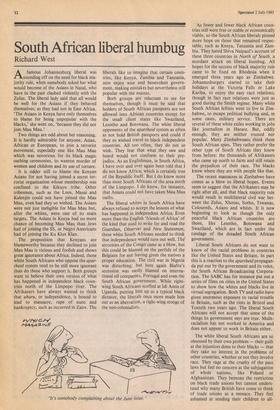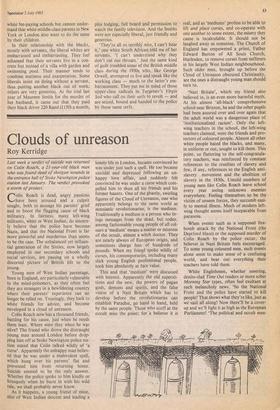South African liberal humbug
Richard West
A famous Johannesburg liberal was
sounding off on the need for black ma- jority rule, when somebody asked her what would become of the Asians in Natal, who have in the past clashed violently with the Zulus. The liberal lady said that all would be well for the Asians if they behaved themselves; as they had not in East Africa. `The Asians in Kenya have only themselves to blame for being unpopular with the blacks,' she went on, 'because they did not join Mau Mau.'
Two things are odd about her reasoning. It is hardly admirable for anyone, Asian, African or European, to join a terrorist movement, especially one like Mau Mau which was notorious for its black magic oathing ceremonies, its wanton murder of women and children and its use of torture.
It is odder still to blame the Kenyan Asians for not having joined a secret ter- rorist organisation whose membership was confined to the Kikuyu tribe. Other tribesmen, such as the Luos, Masai and Kalenjin could not have joined the Mau Mau, even had they so wished. The Asians were not just ineligible for Mau Mau but, after the whites, were one of its main targets. The Asians in Kenya had no more chance of becoming Mau Mau than Jews had of joining the SS, or Negro Americans had of joining the Ku Klux Klan.
The proposition that Kenyans are blameworthy because they declined to join Mau Mau is vicious and foolish and shows great ignorance about Africa. Indeed, those white South Africans who oppose the apar- theid system tend to be still more ignorant than do those who support it. Both groups want to believe their own version of what has happened in independent black coun- tries north of the Limpopo river. The Afrikaners have always wanted to think that uhuru, or independence, is bound to lead to massacre, rape of nuns and bankruptcy, such as occurred in Zaire. The
liberals like to imagine that certain coun- tries, like Kenya, Zambia and Tanzania, now enjoy wise and benevolent govern- ment, making mistakes but nevertheless still popular with the masses.
Both groups are reluctant to see for themselves, though it must be said that holders of South African passports are not allowed into African countries except for the small client states like Swaziland, Lesotho and Botswana. The white liberal opponents of the apartheid system as often as not hold British passports and could if they so wished travel to black independent countries. All too often, they do not so wish. They fear that what they saw and heard would not conform to their pre- judice. As an Englishman, in South Africa, I have over and over again been told that I do not know Africa; which is certainly true of the Republic itself. But 1 do know more than most South Africans of the area north of the Limpopo. I do know, for instance, that Asians could not have taken Mau Mau oaths.
The liberal whites in South Africa have always refused to accept the lessons of what has happened in independent Africa. Even more than the English 'friends of Africa' of the kind that used to write for and read the Guardian, Observer and New Statesman, these white South Africans needed to think that independence would turn out well. The atrocities of the Congo came as a blow, but this could be blamed on the perfidy of the Belgians for not having given the natives a proper education. The civil war in Nigeria was disturbing; but here again Biafra's secession was easily blamed on interna- tional oil companies, Portugal and even the South African government. While right- wing South Africans scoffed at Idi Amin of Uganda, putting him up as a typical black dictator, the liberals once more made him out as an aberration, a right-wing stooge of the neo-colonialists.
`It's somebody complaining about the June issue.'
As fewer and fewer black African coun- tries still were free or stable or economically viable, so the South African liberals pinned more hope on those that remained respec- table, such as Kenya, Tanzania and Zam- bia. They hated Shiva Naipaul's account of these three countries in North of South, a mordant attack on liberal humbug. All hopes for the success of black majority rule came to be fixed on Rhodesia when it emerged three years ago as Zimbabwe. Johannesburgers started to take their holidays at the Victoria Falls or Lake Kariba, to enjoy the easy race relations; though in fact race relations were just as good during the Smith regime. Many white South African leftists went to live in Zim- babwe, to escape political bullying and, in some cases, military service. There are several of these white exiles working in jobs like journalism in Harare. But, oddly enough, they are neither trusted nor popular. Many Zimbabweans think them South African spies. They rather prefer the other type of South African they know from before: the thousands of Afrikaners who came up north to farm and still retain the prejudices of their race. The blacks know where they are with people like that.
The recent massacres in Zimbabwe have comes as a blow to liberal hopes. Events seem to suggest that the Afrikaners may be right after all, and that black majority rule would result in multilateral civil war bet- ween the Zulus, Xhosas, Sotho, Tswanas, Coloureds, Asians and whites. It is now beginning to look as though the only peaceful black African countries are those, like Lesotho, Botswana and Swaziland, which are in fact under the tutelage of the dreaded South African government.
Liberal South Africans do not want to know of the racial problems in countries like the United States and Britain. In part this is a reaction to the apartheid propagan- da put out by the government and its voice, the South African Broadcasting Corpora- tion. The SABC has for instance put out a series of films on cities in the United States to show how the whites and blacks live in virtual segregation. Both TV and radio have given enormous exposure to racial trouble in Britain, such as the riots in Bristol and Toxteth two years ago. The liberal South Africans will not accept that some of the things its government says are true. Mulit- racialism has not worked in America and does not appear to work in Britain either.
The white liberal South Africans are so obsessed by their own problem — their guilt at the injustices done to their blacks — that they take no interest in the problems of other countries, whether or not they involve race. They rage at the cruelty of the pass laws but feel no concern at the subjugation of whole nations, like Poland or Afghanistan. They bemoan the restriction on black trade unions but cannot unders- tand why many British have come to think of trade unions as a menace. They feel ashamed at sending their children to all- white fee-paying schools but cannot under- stand that white middle-class parents in New York or London also want to do the same by their children.
In their relationship with the blacks, mostly with servants, the liberal whites are embarrassed and embarrassing. They feel ashamed that their servants live in a con- crete but instead of a villa with garden and swimming pool. Their manner tends to combine matiness and exasperation. Some liberals insist on doing without a servant, thus putting another black out of work; others are very generous. At the trial last year of Maureen Smith for the murder of her husband, it came out that they paid their black driver 220 Rand (£150) a month, plus lodging, full board and permission to watch the family television. And the Smiths were not especially liberal, just friendly and generous.
'They're all so terribly nice, I can't bear it,' one white South African told me of her servants. `I can't understand why they don't cut our throats.' Just the same kind of guilt troubled some of the British middle class during the 1930s who, like George Orwell, attempted to live and speak like the working class — much to the latter's em- barrassment. They put me in mind of those upper-class radicals in Turgenev's Virgin Soil who call on their serfs to revolt — and are seized, bound and handed to the police by those same serfs.







































 Previous page
Previous page